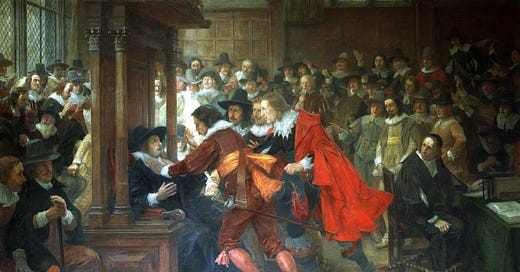Sir John Finch's Terrible, Horrible, No Good, Very Bad Day
This piece is Part II of a series adding historical perspective to the modern wranglings of Congress.
For Part I of the series, click here.
Speaker Sir John Finch was not having a good day, and it was about to get worse. It was March 2, 1629. Sir John had been elected the Speaker of the House of Commons for the third Parliament of the reign of King Charles I of Great Britain. In the two previous Parliaments, Charles I had not proved a popular king with the Commons, and this time it was looking dire. The king’s policies in the state and the Church were irksome to his Commons. His wars against Spain and France had proved anything but successful. His favorite, George Villiers, Duke of Buckingham was, if anything, even less popular than the king – or at least he had been until he was stabbed to death in an inn the previous year in 1628.[1] Providentially, Buckingham’s assassination may have been fortuitous. It seemed to open a path for the king and the fractious lower house of Parliament to come together. But the moment was lost as soon as it appeared in the wranglings over the Petition of Right – a list of grievances in Charles’ government since 1625. The debate over the Petition led Charles to prorogue the first session of his third Parliament and to reconvene it in early 1629.
If Charles thought a break would do the political community some good, he was mistaken. The Commons used the months long postponement to seethe and collect more evidence of the willful abuse of power by the king and his allies. This time, the matter was religion. Charles I was not only king; he was Supreme Governor of the Church of England (as is his modern namesake, King Charles III). Charles’ observance of the Anglican faith was of a distinctly high church variety. To many stricter Protestants such as Puritans, many of whom sat in the Commons, the king and his bishops were introducing religious practices which were taking the established Church back towards the Catholic Church from which Henry VIII had dragged it kicking and screaming a century before. And they were not happy about it. Indeed, many were so unhappy they sailed for the Colony of Massachusetts Bay across the Atlantic to start a new life (whether America or Britain got the better end of that deal is still yet to be determined).
When Parliament reconvened, it was clear to the king, his counsellors, and the conservative and moderate members of the House of Commons that the radical element in the latter was getting increasingly large. And it was going to hold up granting the king a bill for necessary taxation to refill the coffers to discuss the religious reforms they wanted stopped (sound familiar?). By now, Charles was exasperated. He still had hope, though, that his counsellors and the parliamentary leadership could resolve matters in the background. So as soon as Parliament reconvened, the king adjourned it for a week, as was his right by law and custom. All hell then broke loose.
Which brings us back to March 2, 1629. Speaker Finch stood up in the House of Commons chamber to formally adjourn Parliament on behalf of the king. Sir John Eliot, one of the radicals in the Commons, shouted back that the House should take into consideration new resolutions he and others had proposed. Speaker Finch retorted that under no circumstances could they do so; the king commanded Parliament to adjourn and adjourn it must. Eliot and his colleagues were having none of that and yelled out that Finch was their Speaker and, therefore, was subject to their will. As Sir John rose to leave, an incredible sight happened which was not to be repeated in the House of Commons until the proroguing of Parliament in 2019: members of the Commons grabbed the Speaker and forcefully tried to hold him in his seat so the session could continue. Finch tried to escape, but the radical Commons simply held him tighter. Beyond stressed, he began weeping and cried out “I am not less the King’s servant for being yours. I will not say I will not put it to the question, but I must say I dare not.” The king’s serjeant-at-arms (another position the US House of Representatives borrowed from the House of Commons) arrived to demand the ceremonial mace which represented the king’s presence in the Commons. The whole scene was chaos: the serjeant thundered on the door, Eliot gave a bombastic speech, and Finch continued weeping. Surely it was the most chaotic adjournment yet seen in the history of Parliament.[2]
This first episode is an example of where the Speakership found itself entangled in factional politics. Speaker Finch presented himself and his office as a constitutional one. Regardless of whatever Eliot and his acolytes might have believed, the Speaker was the servant of both the Commons and the king. This is a difference in the English (now British) constitution from ours in the United States. The role of the speaker in the early history of its existence was to represent the interests of the Commons to the king and his lords, but also to aid in the management of the Commons on behalf of the crown. Finch was not prepared to see his office subordinated to the howls of a radical element in the lower house. One could imagine him rebuffing Eliot with the following pronouncement: “there are rules, don’t you know, and your desire to see your agenda triumph over all decency, logic, and fairness does not preclude those rules.”
The events of 1629 are, therefore, important to keep in mind for demonstrating the perils of unordered democracy, i.e., mob rule. Speaker Finch stood for the constituted order in standing for the royal prerogative to dissolve Parliament against the wishes of radical parliamentarians. Yet, only thirteen years later in 1642, another speaker would have to stand up for the Commons rights against a king who, if once in the right, placed himself firmly in the wrong with a single, miscalculated act. That will be the subject of the next piece in this series.
[1] M. Kishlansky, A Monarchy Transformed: Britain, 1603-1714 (London and New York, 1996), 89-90.
[2] For all the above, see Kishlansky, A Monarchy Transformed, 113-15.






